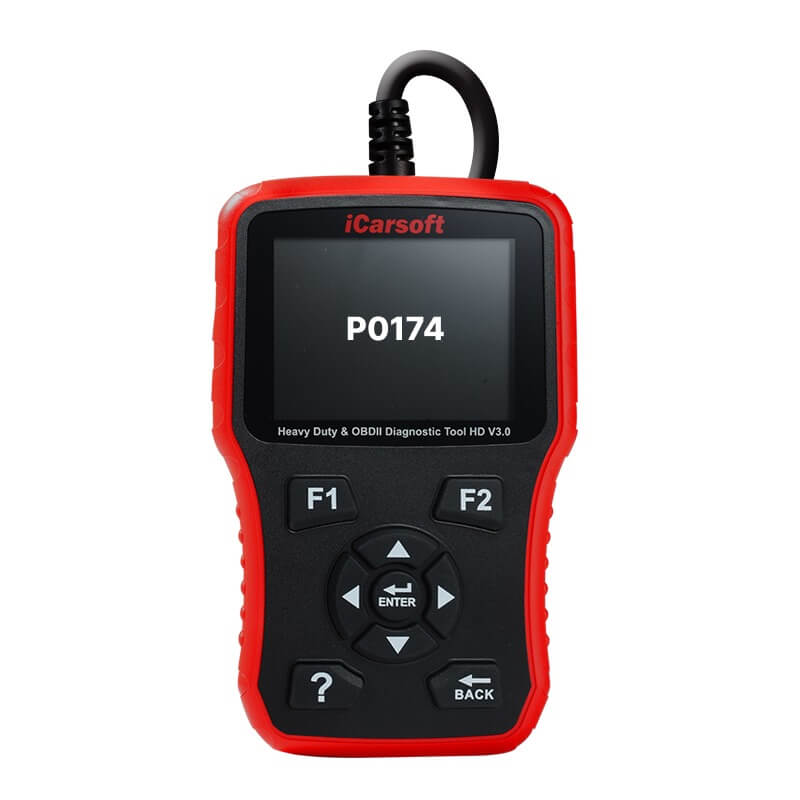P0174 – Fuel Trim System Lean (Bank 2)
POSTED IN pcodes
Welcome to our article on P0174, a common diagnostic trouble code (DTC) that indicates a lean fuel trim system in cylinder bank 2. If you’re experiencing this issue, don’t worry, we’re here to help you understand what it means and how to address it.
DTC P0174 is triggered when the engine’s control module detects a lean running condition in cylinder bank 2. This can be caused by a variety of factors, including outdated PCM software, vacuum leaks, a faulty mass airflow sensor, a faulty fuel pump, or clogged fuel injectors or fuel filter. It’s important to address this code promptly, as it can lead to reduced fuel economy, weak performance, and potential engine damage.
If your vehicle is a Chevy or Ford, you may be more likely to experience this code, but it can occur in other makes and models as well. Symptoms of P0174 can include an illuminated check engine light, engine power loss, misfires, and rough idling. Running lean can also emit nitrogen oxide (NOx) which can be harmful to health and cause respiratory issues. If you notice any of these symptoms, it’s crucial to have the issue diagnosed by a professional.
Key Takeaways:
- DTC P0174 indicates a lean running condition in cylinder bank 2.
- Common causes include outdated PCM software, vacuum leaks, faulty mass airflow sensor, faulty fuel pump, or clogged fuel injectors or filter.
- Symptoms can include check engine light, engine power loss, misfires, rough idling, and emission of nitrogen oxide (NOx).
- Diagnosing the cause can be challenging, and professional assistance may be required.
- Proper repairs and maintenance can help prevent the occurrence of P0174.
Understanding Code P0174 and Lean/Rich Codes
When it comes to diagnosing engine problems, one common trouble code that you may come across is P0174. This code indicates a lean fuel trim condition in cylinder bank 2. But what does that mean exactly? Let’s dive into the technical description, meaning, and severity of the lean fuel trim code P0174.
Technical Description
The lean fuel trim code P0174 is a generic powertrain code that is stored when the Engine Control Module (ECM) or Powertrain Control Module (PCM) detects a lean running condition in cylinder bank 2 of the engine. The ECM/PCM and the O2 sensor work together to maintain a balanced air/fuel mixture in the combustion chamber. When the mixture drifts too far out of balance, the ECM/PCM stores a lean or rich code, and adjusts the fuel trim strategy to bring the mixture back into balance.
Buy tested tuning file for Adblue / EGR / DPF / Adblue off now!
A lean condition occurs when there is too much air and not enough fuel in the combustion chamber. This can be caused by a variety of factors, such as a faulty Mass Air Flow (MAF) sensor, vacuum leaks, or clogged fuel injectors. It is important to address this code promptly to avoid potential engine damage.
Meaning and Severity
A lean fuel trim condition can have a significant impact on your vehicle’s performance and fuel economy. The lean mixture can cause the engine to run hotter, resulting in potential damage to critical components. It can also lead to reduced fuel economy, weak performance, misfires, rough idling, and even engine stalling.
Quote
“Ignoring the P0174 code can lead to reduced fuel economy, weak performance, and potential engine damage. It is crucial to address this issue promptly to ensure optimal performance and longevity of your engine.” – Expert Mechanic
Now that you have a better understanding of the technical description, meaning, and severity of the lean fuel trim code P0174, you can take the necessary steps to diagnose and resolve the issue. In the next section, we will explore the common symptoms associated with code P0174 and the possible causes behind it.
Common Symptoms of Code P0174
When your vehicle displays code P0174, it is essential to be aware of the common symptoms associated with this issue. Recognizing these symptoms can help you diagnose and address the problem promptly. If you experience any of the following symptoms, it is recommended to have your vehicle diagnosed by a professional:
- Illuminated Check Engine Light: The check engine light on your dashboard may illuminate, indicating a potential issue with the fuel trim system.
- Engine Power Loss: You may notice a decrease in engine power, making your vehicle feel sluggish or unresponsive.
- Misfires: Code P0174 can cause engine misfires, which result in a rough and uneven running engine.
- Rough Idling: Your engine may exhibit rough idling, characterized by erratic or unstable RPMs (revolutions per minute) when the vehicle is stationary.
- Engine Stalling: In severe cases, the engine may stall or shut down unexpectedly, leading to potential safety hazards.
It is important to note that running lean can also contribute to the emission of nitrogen oxide (NOx), which can be harmful to health and cause respiratory issues. Therefore, addressing code P0174 promptly is crucial for both engine performance and personal well-being.
Code P0174 can have various common causes, as outlined below:
- Faulty MAF Sensor: A malfunctioning mass airflow (MAF) sensor can cause incorrect calculations of the air entering the engine, leading to a lean condition.
- Vacuum Leaks: Air leaks in the engine’s intake system can result in a lean fuel mixture, compromising combustion efficiency.
- Clogged Fuel Injectors: Over time, fuel injectors can become clogged, impeding the proper delivery of fuel to the combustion chamber.
- Faulty Fuel Pump: A failing fuel pump may not provide sufficient fuel pressure, resulting in inadequate fuel delivery and a lean condition.
- Faulty O2 Sensors or Air-Fuel Sensors: The oxygen (O2) sensors or air-fuel sensors may malfunction, providing inaccurate data to the engine control unit (ECU), causing a lean condition.
Understanding these common symptoms and causes will help you approach the diagnosis and resolution of code P0174 more effectively. If you suspect an issue with your vehicle, it is recommended to consult a professional mechanic for accurate diagnostics and repairs.

Diagnosing Code P0174
Diagnosing the cause of code P0174 can be challenging due to the numerous potential causes. To properly diagnose the issue, it is important to follow these troubleshooting steps:
- Step 1: Use an OBD-II scanner to read the fault codes stored in the ECU. This will provide valuable information about the specific issue.
- Step 2: Perform a visual inspection for vacuum leaks. Check all hoses, fittings, and gaskets for any signs of damage or leakage.
- Step 3: Check the Mass Air Flow (MAF) sensor for cleanliness. A dirty or faulty MAF sensor can affect the air-fuel mixture and trigger a lean condition.
- Step 4: Inspect the fuel injectors for proper functioning. Clogged or malfunctioning fuel injectors can lead to an imbalance in the fuel trim and cause code P0174.
- Step 5: Test the fuel pump pressure to ensure it is within the manufacturer’s specifications. A weak fuel pump can result in insufficient fuel delivery and trigger a lean condition.
- Step 6: Swap the O2 sensors from side to side to determine if the issue is specific to one bank. If the trouble code changes to the opposite bank, it indicates a faulty O2 sensor.
- Step 7: Consult factory repair information or seek professional assistance for a thorough diagnosis. In some cases, specialized equipment and expertise may be required to pinpoint the exact cause of code P0174.
Following these troubleshooting steps will help identify the underlying issue and guide you towards the appropriate repairs or further diagnostics if needed.
Example Diagnostic Troubleshooting Steps:
| Step | Description |
|---|---|
| Step 1 | Connect an OBD-II scanner to the vehicle’s diagnostic port and retrieve the trouble codes. Look for code P0174 in the list of stored codes. |
| Step 2 | Inspect all vacuum lines and hoses for signs of cracks or leaks. Use a vacuum gauge to test for vacuum pressure. |
| Step 3 | Ensure that the Mass Air Flow (MAF) sensor is clean and functioning properly. Clean or replace the MAF sensor if necessary. |
| Step 4 | Check the fuel injectors for proper spray pattern and operation. Use a fuel pressure gauge to verify proper fuel pressure. |
| Step 5 | Test the fuel pump to ensure it is delivering fuel at the correct pressure. Replace the fuel pump if necessary. |
| Step 6 | Swap the O2 sensors from bank 1 to bank 2 and vice versa. Clear the codes and run the vehicle to see if the code changes to the opposite bank. If it does, replace the faulty O2 sensor. |
| Step 7 | If the cause of code P0174 is not identified by the previous steps, consult factory repair information or seek professional assistance for further diagnosis and repair. |
Fixing Code P0174
When it comes to fixing code P0174, there is no one-size-fits-all solution. The causes behind this trouble code can vary, requiring accurate diagnosis and targeted repairs. Once you have identified the issue, you can take the necessary steps to resolve it and ensure optimal engine performance. Here are some common troubleshooting and repair options:
- Cleaning or replacing the MAF sensor: The Mass Airflow (MAF) sensor plays a crucial role in measuring the amount of air entering the engine. Over time, it can become dirty or faulty, leading to incorrect readings and a lean condition. Cleaning or, if necessary, replacing the MAF sensor can help address this issue.
- Repairing or replacing vacuum hoses: Vacuum leaks are a common cause of lean fuel trim conditions. Inspect the vacuum hoses for any signs of wear or damage, and repair or replace them as needed. This will help ensure that the engine receives the proper amount of air for the fuel mixture.
- Cleaning or replacing fuel injectors: Over time, fuel injectors can become clogged, affecting their ability to deliver fuel accurately. Cleaning or replacing the fuel injectors can help restore proper fuel flow and eliminate lean conditions.
- Replacing a faulty fuel pump: A malfunctioning fuel pump can lead to insufficient fuel delivery, causing lean conditions. If diagnosed as the culprit, replacing the faulty fuel pump is essential for resolving the issue.
- Replacing faulty O2 or air-fuel sensors: A malfunctioning oxygen (O2) sensor or air-fuel sensor can provide inaccurate readings, leading to fuel trim errors. If these sensors are determined to be faulty through proper diagnosis, replacing them can help restore proper air-fuel ratios.
Remember, it is crucial to ensure that all repairs are performed correctly and any necessary adjustments to the fuel trim tables are made. Following factory repair information or seeking professional assistance is highly recommended to ensure proper repairs and avoid any further complications.

“Proper diagnosis is key when it comes to fixing code P0174. By accurately identifying the underlying cause and implementing the appropriate repairs, you can restore your vehicle’s fuel trim system and prevent further engine damage.” – CarExpert92
Other Notes About Code P0174
When it comes to code P0174, it is crucial not to ignore the issue and take prompt action for resolution. Ignoring this trouble code can have negative consequences, including reduced fuel economy, weak performance, poor ride quality, and potential engine damage. It is important to address the underlying cause to prevent further complications.
One important consideration is the impact of intake and TB modifications on the occurrence of vacuum leaks and fitment issues. For example, modifications like the BBK intake and TB can potentially contribute to a lean condition. Therefore, it is essential to check for exhaust leaks and ensure proper fitment of aftermarket parts to minimize the risk of a lean fuel trim system.
Regular maintenance practices, such as cleaning the MAF sensor and checking for vacuum leaks, can play a significant role in preventing the recurrence of code P0174. By incorporating these maintenance tasks into your routine, you can help maintain an optimal air-fuel mixture and avoid potential engine problems in the long run.
| Key Points | Considerations |
|---|---|
| Do not ignore code P0174 | – Promptly address the issue to avoid further complications |
| Intake and TB modifications | – Can contribute to vacuum leaks and fitment issues |
| Proper fitment of aftermarket parts | – Essential for preventing a lean condition |
| Regular maintenance | – Cleaning the MAF sensor and checking for vacuum leaks can prevent recurrence |
Possible Causes of Code P0174 Mentioned by Users
Users in online forums have shared their experiences and mentioned additional possible causes of code P0174. These potential causes should be thoroughly inspected and addressed when diagnosing and repairing code P0174.
Exhaust Manifold Issues
Some users have reported that loose or broken bolts on the exhaust manifold can contribute to a lean fuel trim condition. Cracks in the manifold itself have also been identified as a possible cause. It is important to inspect the exhaust manifold carefully to ensure proper function and address any issues.
Stock Intake and Throttle Body (TB) Problems
Issues with the stock intake and throttle body (TB) have been mentioned as potential causes of code P0174. Users have experienced fitment problems with these components, leading to air leaks and a lean fuel mixture. Inspecting the stock intake and TB for any signs of damage or improper installation is crucial when troubleshooting this code.
Vacuum Leaks and Aftermarket Parts
Vacuum leaks and fitment issues with aftermarket parts have also been identified by users as possible causes of code P0174. Any unsealed vacuum hoses or improperly installed aftermarket components can introduce additional air into the system, resulting in a lean condition. Thoroughly inspecting these areas and addressing any leaks or fitment issues is essential for resolving code P0174.
Image: User Experiences
Conclusion
In conclusion, code P0174 is a common trouble code that indicates a lean fuel trim system in cylinder bank 2. Promptly addressing this code is crucial to prevent potential engine damage and optimize fuel economy and performance. Diagnosing the cause of P0174 can be challenging due to the various possible causes, but with the right troubleshooting and repairs, the issue can be resolved.
Regular maintenance practices, such as regularly cleaning the MAF sensor and checking for vacuum leaks, can help prevent the occurrence of code P0174. It is important to stay proactive in maintaining your vehicle to keep it performing at its best.
If professional assistance is unavailable, alternative solutions may be considered, such as permanent removal of the Pcode. However, it is recommended to consult with a professional technician to ensure the proper diagnosis and resolution of the underlying issue.
FAQ
What is code P0174?
Code P0174 indicates a lean running condition in the engine’s cylinder bank 2.
What are the common symptoms of code P0174?
Common symptoms of code P0174 can include an illuminated check engine light, engine power loss, misfires, and rough idling.
What are the possible causes of code P0174?
The possible causes of code P0174 include outdated PCM software, vacuum leaks, a faulty mass airflow sensor, a faulty fuel pump, and clogged fuel injectors or fuel filter.
How can I diagnose the cause of code P0174?
Diagnosing the cause of code P0174 can involve using an OBD-II scanner, performing a visual inspection for vacuum leaks, checking the MAF sensor for cleanliness, inspecting the fuel injectors, and testing the fuel pump pressure.
How can I fix code P0174?
Fixing code P0174 may involve cleaning or replacing the MAF sensor, repairing or replacing vacuum hoses, cleaning or replacing fuel injectors, replacing a faulty fuel pump, or replacing faulty O2 or air-fuel sensors.
Are there any other important notes about code P0174?
It is important not to ignore code P0174 as it can lead to reduced fuel economy, weak performance, and potential engine damage. Regular maintenance, including cleaning the MAF sensor and checking for vacuum leaks, can help prevent the occurrence of this code.
What are some possible causes of code P0174 mentioned by users?
Some users have mentioned possible causes such as loose or broken bolts on the exhaust manifold, cracks in the manifold, and issues with the stock intake and throttle body.


